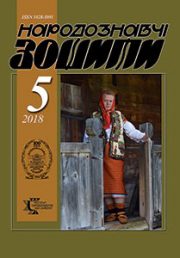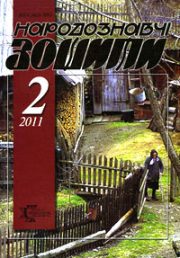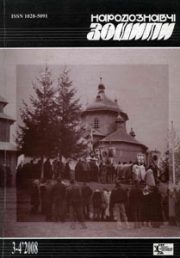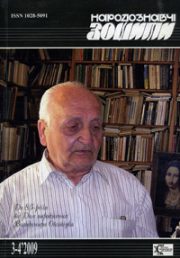The Ethnology Notebooks. 2021. № 4 (160), 792—799
UDK94(=161.2:71)”195/197″
DOI https://doi.org/10.15407/nz2021.04.792
SIROMSKYI Ruslan
- ORCID ID: https://orcid.org/0000-0002-6744-6379
- PhD in History, Associate Professor
- Ivan Franko National University of Lviv,
- The Chair of Modern and Contemporary
- History of Foreign Countries,
- 1, Universytetska str., 79000, Lviv, Ukraine,
- Contacts: e-mail: sir.ruslan@yahoo.com
Abstract. Introduction. In the conditions of statelessness, the tradition of annually celebrating the Independence Day and the Unification of Ukraine on January 22 has acquired special significance in the Ukrainian Diaspora overseas.
Problem Statement. Canadian Ukrainians sought to preserve the memory of the Ukrainian Revolution of 1917—1921, in particular, the proclamation of the independence of the Ukrainian People’s Republic and the unification of Ukrainians on both sides of the Dnipro in one state. This approach contradicted the official position of the Soviet Union, whose Embassy in Ottawa reacted hostilely to the January celebrations, which were authorized by the Canadian authorities.
Purpose. Analysis of the practice of celebrating the Day of Ukrainian Statehood and Unity, their conceptual content and the reaction of the Soviet to the desire of Canadian Ukrainians to preserve the memory of the past.
Methods. The study is based on the principles of historicism and multifactoriality and involves the use of methods of analysis, generalization, comparison.
Results. In consequence of celebration of the Day of Ukrainian Statehood and Unity, Canadian Ukrainians not only managed to preserve the historical memory of the events of the Ukrainian Revolution, but also to draw attention to the violation of the national rights of Ukrainians in the Soviet Union.
Conclusion. Thanks to the celebration of the Day of Ukrainian Statehood and Unity, Canadian society learned more and more about the existence of an independent Ukrainian People’s Republic and the circumstances of its liquidation as a result of the war with Bolshevik Russia. An integral part of the annual celebrations was the display of blue and yellow flags on the boards of Canadian cities, a significant part of the population of which were Ukrainian immigrants. The participation of Canadian politicians and statesmen in the celebrations not only gave them political weight, but also engaged Canadian politicians in current Ukrainian affairs. The Soviet reacted painfully to this by issuing notes of protest and accusing the Canadian authorities of supporting «Ukrainian nationalists». At the same time, the celebration of the Day of Ukrainian Statehood and Unity also to some extent consolidated the disparate circles of Canadian Ukrainians.
Keywords: independence, Canadian Ukrainians, Day of Ukrainian Statehood and Unity, national unity, the Embassy of the USSR in Canada.
Received 27.05.2021
REFERENCES
- Zinkevych, O. (2016). Diary 1948—1949, 1967—1968, 1971—1976. Kyiv: Smoloskyp [in Ukrainian].
- Botsyurkiv, B. (1962). The Science of Great Acts January 22. Winnipeg: Published by New Pathway [in Ukrainian].
- Veryga, V., Lytvyn, M. (Ed.). (2001). Thoughts about the holiday of statehood. Vasyl Veryga. Word and deed. Selected articles, reports, intelligence, biographies. 1946—1988 (Pp. 37—38). Lviv: Ivan Krypyakevych Institute of Ukrainian Studies of the National Academy of Sciences of Ukraine [in Ukrainian].
- Central State Archives of Foreign Archival Ucrainica (TsDAZU). Fund 50. Description 1. Case 2: Documents (circulars, letters, press releases, etc.) on the work of the CE, its regional bodies and the UNO (Canada). May 10, 1946—September 28, 1984 [in Ukrainian].
- TsDAZU. Fund 50. Description 1. Case 5: CE UNO correspondence with the Senate of Canada, organizations and individuals. October`13, 1938—June 27, 1994 [in Ukrainian].
- TsDAZU. Fund 36. Description 1. Case 25: Documents (letters, statutes, regulations, declarations, minutes of meetings, reports, resolutions, newspaper clippings) of public and political organizations that were members SKVU. 1968—December 16, 1977 [in Ukrainian].
- TsDAZU. Fund 36. Description 1. Case 66: Documents (reviews, materials of debates, special reports, letters, clippings from newspapers, magazines, etc.) of the US Congress, the Senate of Canada on Human Rights, events in the USSR, etc. May 17, 1976—July 1, 1986 [in Ukrainian].
- Sectoral state archive of the Ministry of Foreign Affairs of Ukraine (SSA MFAU). Fund 1. Description 2. Case 1824: Correspondence of the Press department with foreign institutions on Ukrainian emigration, foreign policy propaganda. January 4—March 24, 1968 [in Ukrainian].
- SSA MFAU. Fund 1. Description 2. Case 2711: Recordings of conversations, diaries of employees of embassies or missions of the USSR in foreign countries, January 8— November 18, 1974 [in Ukrainian].
- SSA MFAU. Fund 1. Description 2. Case 3279: Recordings of conversations of employees of Soviet embassies abroad on Ukrainian emigration. January 13—December 10, 1976 [in Ukrainian].
- SSA MFAU. Fund 1. Description 2. Case 4304: Recordings of conversations, diaries of employees of embassies, missions of the USSR and the Ukrainian SSR, Soviet employees of the secretariats of international relations on emigration. January 9— October 10, 1981 [in Ukrainian].
- Sectoral State Archive of the Foreign Intelligence Service of Ukraine. Fund 1. Case 16310: Proceedings of the XIV UCC Congress (Vol. 6, pp. 58—67) [in Ukrainian].
- (1966, January 29). Echo Ukraine [in Ukrainian].
- (1967, January 28). Canadian farmer [in Ukrainian].
- (1967, February 4). Canadian farmer [in Ukrainian].
- (1959, January 23). New Pathway [in Ukrainian].
- (1963, March 2). New Pathway [in Ukrainian].
- (1965, September 2). Ukrainian News [in Ukrainian].
- Pyshkalo, I. (1972). Golden rings of the chain of Ukrainian Statehood. New days, 265, 28 [in Ukrainian].
- (1958). Debates of the Senate. Official Report (Hansard). 23rd Parliament, 1st session. Ottawa.
- (1958, January 24). Winnipeg Free Press.
- Siromskyi, R. (2020). Human Rights in the Ukrainian SSR: A View from Canada (1945—1991). Lviv: Triada Plus [in Ukrainian].
- Yuzyk, P. (1973). For a Better Canada: A Collection of Selected Speeches Delivered in the Senate of Canada and at Conferences in Various Centres across Canada. Toronto: Ukrainian National Assembly.
- (1964). Diefenbaker condemned Moscow’s colonialism. Screen, 13, 6 [in Ukrainian].
- Volyniak, P. (1958). Exemplary celebration of the 40th anniversary of Ukraine’s independence. New days, 98, 20 [in Ukrainian].
- Onushko-Tykhovska, L. (2012). Networks IV. Kyiv: Kyiv-Mohyla Academy House [in Ukrainian].
- Bazhan, O., Danilyuk, Yu., & Tronko P. (Ed.). (2003). On the scrolls of history: From the history of relations between government structures and public circles of Ukraine with the Ukrainian-Canadian community in the second half of the 1940s—1980s. Collection of documents and materials. Kyiv: Institute of History of Ukraine; National Academy of Sciences of Ukraine [in Ukrainian].
- (1969). «Protocol» forbade hanging the Ukrainian flag over the town hall of the Canadian capital. Screen, 43—44, 2 [in Ukrainian].
- (1969, 23 January). Ottawa Citizen.
- Roberts, G., & Cipko, S. (2008). One-Way Ticket. The Soviet Return-to-the-Homeland Campaign, 1955—1960. Manitock: Penumba Press.







